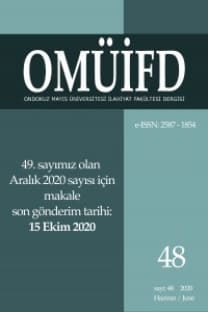Kâdî Abdülcebbâr'ın İnsan Ruhu Kavramı ile İlgili FizikselYaklaşımının Tarihsel Değerlendirmesi
The Historical Account Of ʿabd Al-Jabbār Al-Hamadani’s Physicalist Conception Of Human Soul
___
- Abd al-Qahir al- Baghdadi, ‘Al-Farq bayn al-Firaq’ Turkish translation by Ethem Ruhi Fığlalı Mezhepler Arasındaki Farklar (Ankara, 2017)
- Abdul - Jabbār [Mankadīm Shashdīw], Šarḥ al-uṣūl al-ẖamsa, ed. Metin Yurdagur (Istanbul, 2013)
- Abdul Jabbâr, Qadi, al- Muġnī fī Abvâbi’t-Tawhīd va’l-‘Adl, ‘al-Taklīf’ ed., M. Khodor Nabha (Dar Al-Kotob Al-Ilmiyah, 2012)
- Cengiz, Y. ‘Two Competing Approaches in the Mu‘tazilite View of the Human Being: The Traditions of Abu al Hudhayl and al-Nazzam,’ Nazariyat Journal for the History of Islamic Philosophy and Sciences, 4/2 (May 2018) pp. 57-73.
- Crone, P. ‘The Dahris According to al-Jahiz’, in H. Siurua (eds.), Islam, the Ancient Near East and Varieties of Godlessness, Vol. 3. (Leiden, 2016)
- Dhanani, A. The physical Theory of Kalam: Atoms, Space, and Void in Basrian Mutazili Cosmology, (Leiden, 1994)
- Fakhry, M. ‘The Muʿtazilite View of Man’, Recherches d’islamologie: Recueil d’articles offert á Georges C. Anawati et Louis Gradet par leur collègues et amis, (Leuven, 1977) pp. 107-121.
- Frank, R. M. The Metaphysics of Created Being According to Abu l-Hudhayl Al-Allaf A Philosophical Study of the Earliest Kalam, (Istanbul, 1966)
- Hākim al-Jusheymi, ʿuyūn al-Masāil fī Usūl al- Taklīf, ed. Ramzan Yıldırım (İstanbul, 2018)
- Horovitz, S. ‘Uber den Einfluss der griechischen Philosophie auf die Entwicklung des Kalam’ (Breslau,1909) Turkish translation Ö. Taşcı., Yunan Felsefesinin Kelâma Etkisi, (Istanbul, 2014)
- Ibn al-Mattawayh, Tadhkira fi ahkam al-jawahir wa al-arad. Ed. S. Lutf and F. ‘Awn. (Cairo. 1975)
- Ibn an-Nedim, el-Fihrist, edited by M. Yolcu., (Istanbul, 2017)
- Madelung, W. ‘Ibn al-Malâhimi on the human soul’, The Muslim World, Vol. 102., (2012), pp. 426-32
- Mirecki, P. & Beduhn, J., The Light and the Darkness studies in Manichaeism and its World, (Leiden, 2001)
- Pessagno, J. M. ‘Irada, Ikhtiyar, Qudra, Kasb the View of Abu Mansur alMaturidi’, Journal of the American Oriental Society, Vol. 104, No. 1, Studies in Islam and the Ancient Near East Dedicated to Franz Rosenthal (Jan. – Mar., 1984), pp. 177-191.
- Peters, J. R. T. M. God’s Created Speech A study of the Muʿtazilî Qadî l-Qudât Abu lHasan ‘Abd al-Jabbâr bn Ahmad al-Hamdânî, (Leiden, 1976)
- Reeves, J. C. Prolegomena to a History of Islamicate Manichaeism (Canada, 2011)
- Reynolds, G. S. A Muslim Theologian in the Sectarian Milieu ʿAbd al-Jabbār and the Critique of Christian Origins, (Brill, 2004)
- Shahrastānī (d. 1153), Milel ve Nihal, (turkish trans.). Mustafa Öz (Istanbul, 2011)
- Shihadeh, A. ‘Classical Ashʿarī Anthropology: Body, Life and Spirit’, The Muslim World, Vol. 102. (July/ Oct., 2012), pp. 433- 477.
- Stroumsa, S. “Early Muslim and Jewish Kalām: The Enterprise of Reasoned Discourse,” in Christoph Markschies and Yohanan Friedmann, ed., Rationalisation of Religion: Judaism, Christianity and Islam (Jerusalem and Berlin: The Israel Academy of Sciences and Humanities and de Gruyter, 2019)
- Stroumsa, S. & Stroumsa, G. G. ‘Aspects of Anti-Manichaean Polemics in Late Antiquity and under Early Islam’, The Harvard Theological Review, Vol. 81. No. 1. (Jan., 1988), pp. 37-58.
- Van Ess, J. The Flowering of Muslim Theology, trans. J. Marie Todd. (London, 2006)
- Van Ess, J. Theologie und Gesellschaft, Vol. III Translated by G. Goldbloom, (Leiden, 2018)
- Yayın Aralığı: 2
- Başlangıç: 1986
- Yayıncı: ONDOKUZ MAYIS ÜNİVERSİTESİ
TANRI İMGESİ BAĞLAMINDA TANZİMAT ŞİİRİNİN TARİHSELLİĞİ
ÂDİL BİR DÜNYA ÜMİDİ Cafer Sadık Yaran, Âdil Bir Dünya Ümidi (İstanbul: Rağbet Yayınları, 2019)
İmam Mâtürîdî'de Hidayetin Yöntem ve Çeşitleri
HARUN ÇAĞLAYAN, HARUN ÇAĞLAYAN
KUR’ÂN’IN CEM‘İ MESELESİNE SÜYÛTÎ VECHESİNDEN BİR BAKIŞ
Kâdî Abdülcebbâr'ın İnsan Ruhu Kavramı ile İlgili FizikselYaklaşımının Tarihsel Değerlendirmesi
